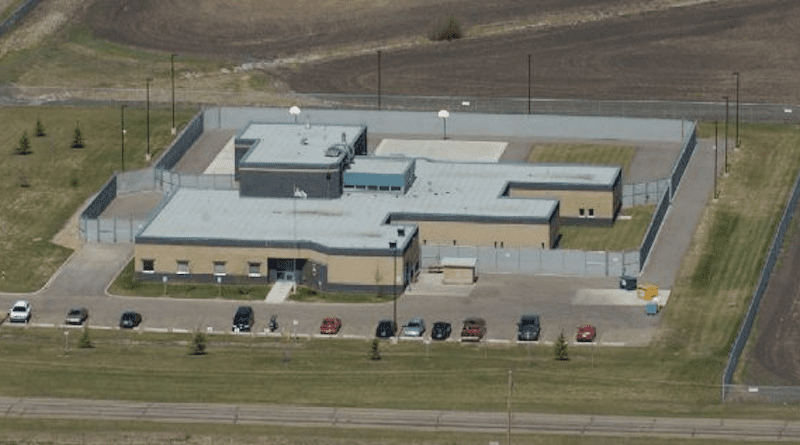Obscene Waste Of Taxpayers’ Money – OpEd
By Tim Dunne
While the Canadian Forces Detention Barracks and Service Prison (CFDBSP) at Canadian Forces Base Edmonton lies empty almost all the time, it continues to have a staff of 28 members of the Military Police branch:
- 1 Major
- 1 Master Warrant Officer
- 1 Warrant Officer
- 6 Sergeants
- 7 Master Corporals
- 12 Corporals
The cost to the Canadian taxpayer $2.2 million per year in salaries for custodians of a largely prisoner-less prison. Allowing this to continue unabated is an obscene waste of taxpayers’ money.
Sarcastically nicknamed “Club Ed,” it is a small 25-cell prison constructed in Edmonton in 2000 at a cost of $3.45 million.
Inmates (when there are any) begin their day at 6 a.m. Their time would be filled with duties, drill, cleaning and shining until mandatory lights out at nine p.m. Speaking, smoking and visitors are forbidden until the inmate earns a required number of points, called marks.
Detainees (when there are any) are service personnel who have been found guilty of minor offences by their commanding officers or their designated representatives, and have been sentenced to 30 days or less at a summary trial.
On 10 May 2018, the Canadian government introduced Bill C-77 (An Act to amend the National Defence Act and to make related and consequential amendments to other Acts). This fundamentally changed Canadian military justice by replacing summary trials with summary hearings and removing detention from the list of punishments that can be awarded.
Bill C-77 received Royal Assent on 21 June 2019, entrenching it in Canadian law. One would think that detention was finally erased from military punishments, but one would be wrong.
To be enacted, individual increments of this new legislation required Orders in Council.
The Judge Advocate General could simply send a general message telling commanders and commanding officers that the Government of Canada has decided that detention is eliminated from the scale of punishments for summary trials.
But this did not happen, and the federal government dragged its feet in issuing the Order In Council replacing summary trials with summary hearings.
Service members found guilty of minor offences at a summary trial continued to be sent to Club Ed for periods of up to 30 days for a further three years, until May 2022.
Prisoners served sentences when found guilty at a court martial and sentenced to longer periods of incarceration.
If a prisoner’s sentence is two years or longer, they will serve the first two years less one day at CFDBSP and then are transferred to a federal penitentiary for the remainder of the sentence. ”Dismissal” or “dismissal with disgrace” can be included with sentences of imprisonment.
During the Second World War, the Army operated 32 detention barracks across Canada that could accommodate some 2,000 soldiers.
However, by the mid-1980s, Club Ed was the sole remaining facility which, at its height, had an average inmate population of 55 supervised by 35 Military Police disciplinarians who enforced a severe and rigid disciplinary regime.
However, between 2008 and 2012, an average of 42 inmates per year were sent to the Edmonton detention barracks.
With changing times, fewer soldiers have been sentenced to do time, and is now a rarity. Some factors influencing this reduction include Canada’s Charter of Rights and Freedoms, which mandated changes to the military justice system. Other factors include improved training for recruits about proper conduct and ethical behaviour, and they may benefit from better leadership and a growing civilian influence.
While detention is no longer a punishment option, there is no intention to remove “Detention Barracks” from the title.
CFDBSP stands empty of prisoners most of the time – except for the 28 staff members who are retained “just in case” a military member or two are sentenced to incarceration.
In general, the very few who are “imprisoned” do not return to military service. If their sentences extend beyond “two years less a day” they will complete their sentences at a federal penitentiary. After completion of their sentences, they can be released, dismissed or dismissed with disgrace.
If all 25 cells of the CFDBSP were occupied the cost to the Canadian taxpayer would be $100,000 per prisoner.
It is time that military personnel sentenced to imprisonment are removed from the Canadian military on conviction and sent directly to a federal facility. The number of Military Police members be reduced by 28, the same number who are so obscenely underemployed, saving the beleaguered Canadian taxpayer $2.2 million per year.
This article was published at Frontline


While I do not necessarily disagree with your piece, you make a fallacious assumption about salaries. If you closed the barracks all you would save is the O&M on the building. The CAF is not going to fire 28 military police as those are positions (or PYs) within the CAF which is set by Treasury Board – you can only have so many sergeant infantry soldiers for example. Perhaps not a great example, but I feel you should know this with 37 years in the CAF.
So here is how it would work – If they closed the detention barracks the Base Commander would save on some O&M costs, that’s it. He would still have to provide some minimal maintenance funds to keep it at a care taker status – cannot just let it rot – not a good use of public money. Most likely it would very quickly be repurposed. The military police would be posted to other bases into vacant positions or perhaps into an OMM position until another slot opened up.
I found your piece a bit disingenuous given your career in the CAF and an officer no less. You did the CAF a disservice today with this piece – not fair and not accurate.